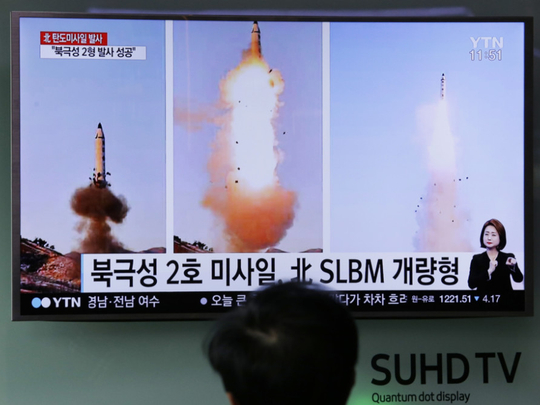
While global media outlets have never had a dull moment since January 20, when Donald Trump was officially inaugurated as the 45th President of the US, this weekend’s announcement by North Korea that it had successfully tested a new ballistic missile was seen by many as a direct challenge to Trump.
“Three weeks into his presidency, Donald Trump has given numerous indications that he wants to put domestic issues first in his effort to ‘Make America Great Again’. The security of the United States’ borders, the protection of its workers and a conservative vision of its culture have all been the subject of executive orders and presidential pronouncements. Little has been achieved without controversy,” said the Independent, broadly outlining the context for its argument.
“Yet however much President Trump may prefer to focus on America’s internal affairs, it was only a matter of time before his approach to pressing global concerns faced a severe challenge. Following the trial firing of a ballistic missile by North Korea this weekend, the moment may have come. Indeed, for all the talk about defeating [Daesh], rewriting US policy towards the Middle East and potential changes to America’s relationship with Nato, perhaps it is no real surprise that it is Kim Jong-un who has provided the first major test of Mr Trump’s diplomatic mettle. There is no more unpredictable nation in the world than North Korea, which makes President Trump’s response to its latest posturing all the more significant,” the newspaper said.
Observing that the missile was timed to coincide with a visit to the US by the Japanese Prime Minister, Shinzo Abe, the paper said: “Abe declared the test to be ‘absolutely intolerable’. His presidential host, meanwhile, spoke of the importance of America’s ‘great’ alliance with Japan, behind whom the US would stand ‘100 per cent’.”
“In the long run, North Korea must be made to understand that it cannot risk attacking another nation. But it is only by effective diplomacy that there can be any chance of Kim Jong-un’s regime being brought to heel. And for that to happen, President Trump must understand that America’s most important role in the region is not as Pyongyang’s policeman but as the vital glue in the complex relationship between the more rational powers of Japan, South Korea and China,” the paper said.
In South Korea, the Korea Herald picked up the issue for editorial comment and said: “By firing a missile Sunday, North Korea seems to have abandoned its wait-and-see attitude toward the Donald Trump administration. It has shown its will to go its own way, no matter what happens. North Korea should know the US has turned tough on its nuclear and missile development under Trump. US Senator Bob Corker, chairman of the Senate Committee of Foreign Relations said Washington should think ‘outside the box’ regarding its strategy toward Pyongyang, and that one example is to be prepared to pre-emptively strike against a North Korean ICBM. US Secretary of State Rex Tillerson said he would keep all options on the table, including the threat of military force.”
While conceding that a pre-emptive strike appears unlikely in the immediate future, the paper said: “If North Korea crosses a red line, the US may take action to protect its people. However, such an extreme step must never be taken without South Korea’s knowledge.”
In China, the Global Times newspaper said in an editorial: “The North Korean nuclear issue is in a serious impasse... Given Trump’s reputation for boldness, it is hoped that he will go beyond the lip service of the previous US president, delve into the deep reasons for the North Korean issue and have some action.”
Since was clear that the Trump administration was going to adopt a hardline approach in policy-making, it is no surprise that Pyongyang is “going back to its old playbook” of using missile provocations to see if the US would respond to its demands, the paper said. The Trump administration is expected to exert pressure on North Korean ally China to rein in Pyongyang’s nuclear ambitions, but Beijing has maintained all along that dialogue is key to resolving the issue, it said.




_resources1_16a31069e4e_small.jpg)







